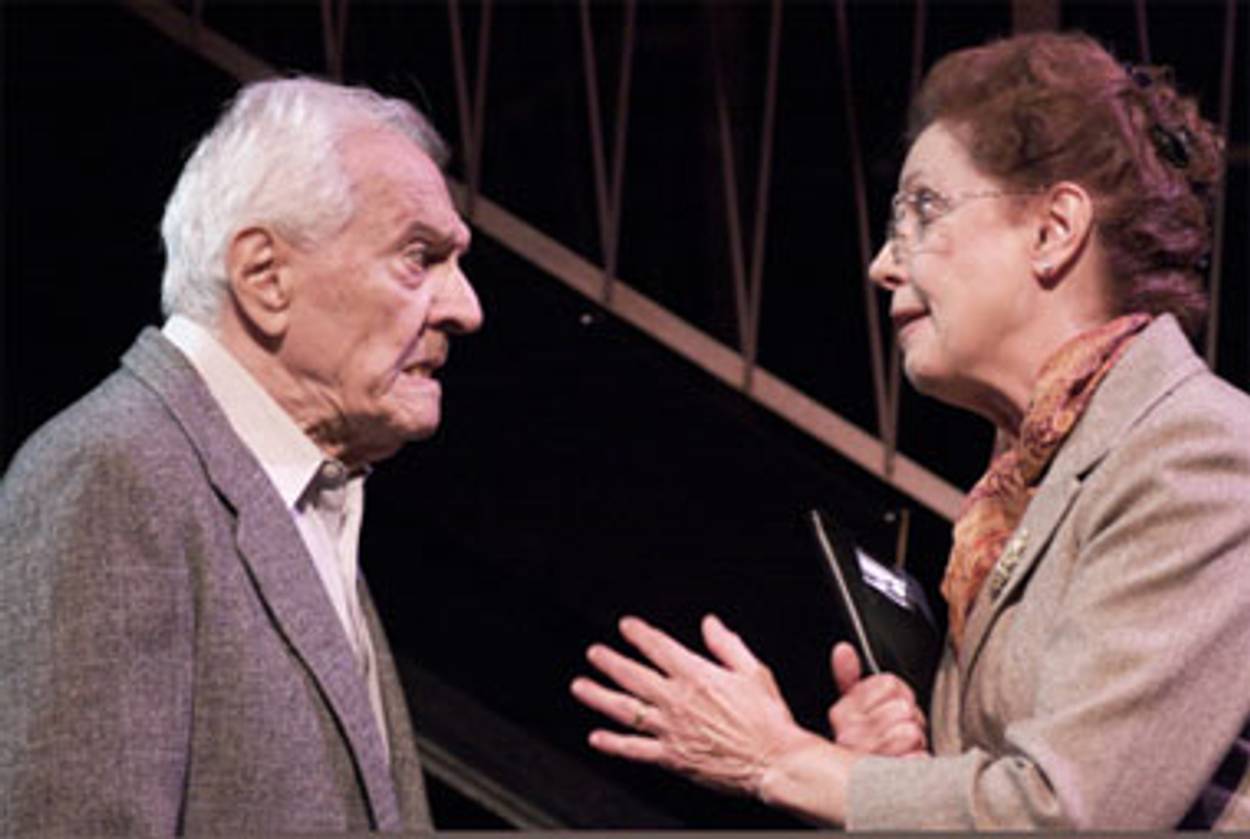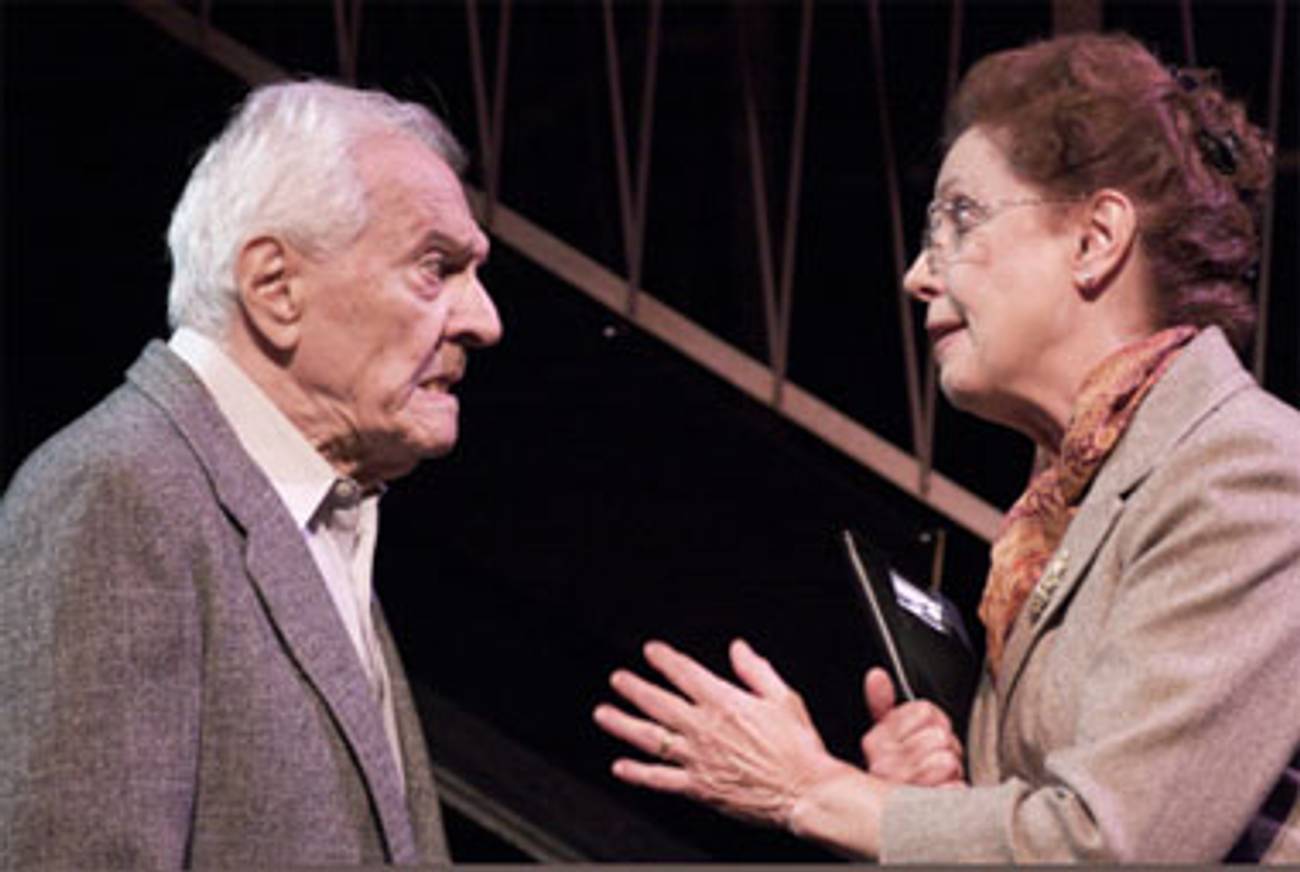False Witness
A play examines the notion that Nazis made soap from Jewish flesh




In the YouTube trailer for a new play running at a small theater in New York, an unseen interviewer asks people in a park whether they’ve heard of “the soap myth.” Most of them look befuddled, but some eventually realize that the question refers to the belief that the Nazis made soap from human corpses. But the last interviewee, a yarmulke-wearing old man with a pinched, angry face, is different. He was in a concentration camp, he says, and a particularly sadistic trick the Nazis played involved a scheme in which Jews would be led to what they thought were gas chambers “and water would come out! We would splash about and celebrate. And then someone said the soap was impure. Some almost tried to tear the lather from the skin until it started to bleed. You understand that the Germans were laughing at us as we cleaned ourselves with the dead corpses of our fathers and mothers and sisters and brothers.”
It’s a hair-raising story, but the man on the bench isn’t a real Holocaust survivor, and the man behind the camera is Jeff Cohen, a playwright whose new show, The Soap Myth, opened last week. The play is based on the story of a survivor named Morris Spitzer. In his later years, Spitzer, who died in 2005, campaigned tirelessly to convince the academic establishment and the public at large that the Nazis did indeed make soap out of their Jewish victims—an idea now largely discredited by serious Holocaust scholars. But at the heart of his saga, and of Cohen’s play, is much more than the veracity of a particularly gruesome Holocaust story; what’s at stake here is the way we choose to see the past, a struggle between a dispassionate approach relying on facts and figures and another, much more subjective one that holds survivors’ testimonies to be unarguably true and ultimately sacred. As fewer and fewer survivors remain alive to tell their stories, this debate takes on a special urgency. How we choose to remember, scholars and survivors alike now realize, may very well determine what we choose to remember.
The Soap Myth tells the story of a young reporter for a progressive Jewish publication who’s assigned to write a story about Milton Saltzman, an elderly survivor on a one-man mission to get the “soap myth” reclassified as fact. Brandishing a photograph of soap bars being buried in a Jewish funeral after the war, he harangues everyone from leading Holocaust scholars to a thinly-veiled version of sexpert Rabbi Shmuley Boteach; by the time pink-cheeked journalist Annie Blumberg enters the scene, everyone else has lost patience, but Blumberg gives him a hearing. In the end, she is so moved by his dogged persistence that, in a lengthy final monologue, she renounces her own claim to journalistic fact-weighing. “Did the Nazis manufacture soap from the fat they removed from the corpses of murdered Jews?” she asks. “I don’t know. But I do know that we owe it to Milton and his brethren to believe them. Even in the face of a lack of evidence.”
In real life as in the play, the notion that Nazis made soap from humans was accepted by scholars for several decades after the Holocaust, based largely upon the testimony of three witnesses at the Nuremberg trials and photographs like Saltzman’s. It seems clear that the people who participated in funerals for bars of soap believed that they contained human material, but whether they were correct or whether the Nazis had concocted the soap stories as a way to further terrorize their captives is less so.
“I don’t see why anyone would doubt that the Nazis may have experimented with the soap thing, but they didn’t do it on a large scale, and it was far more widespread and persistent as a rumor than any facts that may have justified it,” said Melvin Konner, who discusses the Nazis’ use of human flesh in his recently released book The Jewish Body (Nextbook Press). Another scholar who has written extensively on matters concerning the Jewish body, Sander Gilman, wrote in an email to Tablet that the soap claims bring to the fore an enduring question about “the underlying intent of the Shoah and the Nazis”: were the Holocaust’s perpetrators “functionalists” determined to get the maximum economic gain from their victims (which, he notes, “provides a rationale for the ‘Nazi soap’ image”) or were their motives purely ideological? But for Gilman, the question of Nazi motivations is purely hypothetical in this case, since “the processing of human fat into soap during the war, as far as all documentation goes, never actually happened.”
Because of this skepticism, institutions like the United States Holocaust Memorial Museum in Washington, D.C., the Simon Wiesenthal Center in Los Angeles, and Yad Vashem in Jerusalem do not include exhibits on soap, despite Spitzer’s best efforts. An article about Spitzer in Moment magazine, an independent Jewish glossy, quoted Aaron Breitbart, a researcher at the Wiesenthal Center, who said that “the leading scholars of the Holocaust are of the opinion that the Nazis did not make soap. It was a cruel rumor at the camps.” Indeed, according to historian Michael Berenbaum—whom Cohen disapprovingly quotes in his YouTube video—not since the early 1980s have historians accepted these rumors as true. DNA tests have proved inconclusive, some of the Nuremberg testimonies are believed to have been coerced, and the extensive paper trail the Nazis left about so many other atrocities is, in this instance, nowhere to be found. “No responsible historian I know has made the claim that soap was made of human flesh because they’ve seen the same evidence I have,” Berenbaum said.
The scholars may have reached a consensus—but that’s because the scholars, Cohen, the playwright, argued in an interview, have been cowed by Holocaust deniers who eagerly exploit ambiguities in the historical record. While historians used to consider survivor testimony—whether collected at the Nuremberg trials or coming from an isolated source like Spitzer—ample enough evidence to add a claim to the historical record, Cohen went on, they are now afraid to make controversial claims lest deniers use them to say that the Shoah itself never happened. Asked whether he thought it was possible that historians’ standards had simply grown more stringent over time, he said, “If evidentiary standards change such that they can’t find the evidence for ovens at Auschwitz, do we say the ovens didn’t exist?”
Cohen’s critique points to an underlying question for scholars and educators: how should survivor testimony be treated in relation to other kinds of evidence? One school of thought holds that survivor testimony can offer a truth beyond the second-hand accounts of historians. Claude Lanzmann, the maker of Shoah, for instance, argues that when we study the Holocaust, “no true knowledge pre-exists the process of transmission”—in other words, it is testimony itself that creates historical truth. But there has also been a backlash against this idea. Literature professors Andrew S. Gross and Michael J. Hoffman argue in a 2004 paper that the dominant mode of Holocaust historiography today privileges “memory over history, experience over event.” Vaunted works like Shoah and exhibits at U.S. Holocaust Memorial Museum, they write, elevate unedited survivor testimony over research-based scholarship in an attempt to make the Holocaust more accessible, but risk obscuring the facts in the process.
Taken to its extreme, Gross and Hoffman go on to argue, a refusal to question survivor testimony can engender willful departures from the truth like those perpetrated by Binjamin Wilkomirski, author of the fraudulent Holocaust memoir Fragments. Wilkomirski, a Swiss gentile with the given name Bruno Grosjean, fooled editors, critics, and readers into believing he was a Polish Jewish Holocaust survivor. When questioned about inconsistencies in his story, Grosjean said that trauma had rendered him unable to organize his past in a logical way, but to his supporters it almost didn’t matter; it was as though whatever Grosjean said was true simply by virtue of a survivor having said it. Similar discomfort around questioning testimony was engendered by more recent fabricated Holocaust memoirs like Misha Defonseca’s Surviving with Wolves and Herman Rosenblat’s Angel at the Fence.
The tension between eyewitness testimony and dispassionate research is at the heart of The Soap Myth. Cohen, whose previous work includes adaptations of Chekhov and a play about his father’s tennis buddies, said that he became interested in the topic after Spitzer approached him outside a Manhattan theater with the issue of Moment magazine that included the article about him. Though the article (which is not available online) was extremely sympathetic to Spitzer, it ultimately did little to help his crusade. Cohen never saw Spitzer again—in fact, he found out that Spitzer had died only by way of a death notice in a Bronx newspaper. But he remained fascinated by the story—the question, as he put it in an interview with Tablet, of “how one survives surviving,” as well as the politics of Holocaust scholarship—and eventually dramatized it.
Cohen’s conclusion, as expressed in an interview and implied in his play, puts him at the far end of the testimonial side of the spectrum. “Do [scholars] believe the evil side of the anti-Semitism or believe the victims who lived through it?” he asked. “Historians need to choose a side.” The play ends at a similar impasse, when Blumberg cannot convince Saltzman to record his memories for the Holocaust Memorial Museum archives. For Saltzman, as for the scholars, truth is an all-or-nothing proposition—he doesn’t want his testimony accepted as his truth, but as the truth. Blumberg comes to share his position in her final speech, dismissing scholarly objections to the soap myth as “sophistry.” Cohen’s and his characters’ refusal to compromise amounts to no less than an indictment of the standards that undergird the writing of history.
Marissa Brostoff, a doctoral student in English at the CUNY Graduate Center, is a former staff writer at Tablet and the Forward.
Ari M. Brostoff is Culture Editor at Jewish Currents.